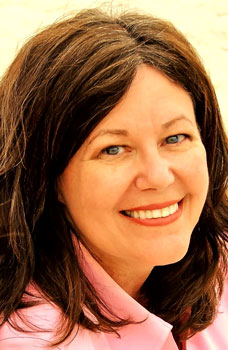
Tracey Enerson Wood has always had a writing bug. While working as a Registered Nurse, starting her own Interior Design company, raising two children, and bouncing around the world as a military wife, she indulged in her passion as a playwright, screenwriter and novelist. She has authored magazine columns and other non-fiction, written and directed plays of all lengths, including Grits, Fleas and Carrots, Rocks and Other Hard Places, Alone, and Fog.
Currently, Tracey focuses on finding amazing women in history whose stories need to be brought to life. She is eternally grateful to Sourcebooks Landmark for bringing this dream to reality. Tracey's debut novel, The Engineer's Wife, is an international and USA Today bestseller. Her second novel, The War Nurse was released in 2021 in hardback and 2022 in trade paperback to great acclaim. The President's Wife, focusing on Edith Bolling Wilson, who some claim was the first female U.S. president, was released in summer 2023.
Her screenplays include Strike Three and Roebling's Bridge. Other passions include food and cooking, and honoring military heroes. Her co-authored anthology/cookbook Homefront Cooking, American Veterans share Recipes, Wit, and Wisdom, was released by Skyhorse Publishing in May, 2018, and all authors' profits will be donated to organizations that support veterans. A New Jersey native, she now lives with her family in Florida.
Tracey Enerson Wood's website
This bio was last updated on 07/30/2023. In a perfect world, we would like to keep all of BookBrowse's biographies up to date, but with many thousands of lives to keep track of it's simply impossible to do. So, if the date of this bio is not recent, you may wish to do an internet search for a more current source, such as the author's website or social media presence. If you are the author or publisher and would like us to update this biography, send the complete text and we will replace the old with the new.
How did Julia Stimson evolve as you started to relive her story?
First, I read the collection of her letters in Finding Themselves. This gave me a good idea of her voice and perspective of the events. I realized that what she wrote home was probably censored, both officially and by her, so as not to upset her family too much with how difficult a situation she was in. So I continued my research, reading diaries of other World War I nurses, along with other historical references. One reference, a letter from one of the real doctors to his wife, spoke glowingly of Julia: her organizational skills and positive relationships. This enabled me to fill in the blanks and hopefully present a more realistic view of what Julia went through. She became a more three-dimensional person in my mind, with hopes and fears, regrets and insecurities—most of which she had kept to herself.
How does working with a true historical figure change the process of getting to know your characters?
I think it is more difficult to work with a true historical figure, because you are limited in many ways, such as time and geography. I would have loved, for example, to put Julia in more physical danger from the war, but that would be too far from documented ...




It is always darkest just before the day dawneth
Click Here to find out who said this, as well as discovering other famous literary quotes!
Your guide toexceptional books
BookBrowse seeks out and recommends the best in contemporary fiction and nonfiction—books that not only engage and entertain but also deepen our understanding of ourselves and the world around us.